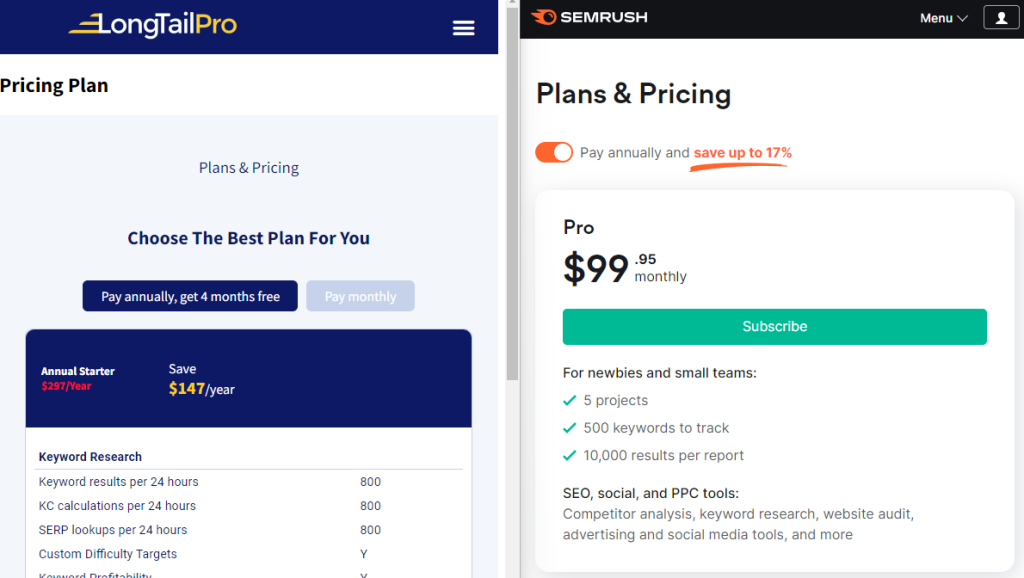Business
The TopRanked.io Weekly Digest: What’s Hot in Affiliate Marketing [Week 1]
Another week, another doomsday prediction that’ll hit affiliate marketers where it hurts. This time, it’s the death of Google (which naturally means the death of SEO). So what’s this end of Google theory, and does it hold any weight? Let’s take a look. And while we’re at it, we’ll also take a look at a great SEO program you can promote, just in case Google/SEO do live to fight another day.

We independently review products to bring you the best of the best. When you click a LongTailPro affiliate program link, we may earn a small commission.
Everyone knows that Google and affiliate marketing go hand in hand. At least, they do for those with any sort of SEO strategy. But that’s kinda obvious, right?

But what might not be so obvious is what we’ll all do when Google dies.
And before you say, “that’s impossible,” take a look at what the pundits have been saying lately.

Fortunately, if you ask us, this whole shebang will probably play out a little like that whole Mayan doomsday thing. Remember that?

But more on that in the news section.
For now, all you need to know is that Google (and hence, SEO) prolly ain’t going anywhere anytime soon.
So let’s celebrate another averted doomsday with a very special affiliate program.
TopRanked.io Affiliate Partner Program of the Week – LongTailPro Affiliate Program
If our theories are correct (again, read the news section), then traditional SEO isn’t going away anytime soon. That means there has never been a better time to help people to get it right.
So to help them while earning yourself a pretty penny along the way, a great program to try would be this week’s #1 addition to the TopRanked affiliate marketing directory — the LongTailPro affiliate program.

What’s So Great About the LongTailPro Affiliate Program?
We won’t bore you with a review of the product behind the LongTailPro affiliate program itself. Instead, we’ll turn to AuthorityHacker’s summary — “A full-fledged SEO tool. It’s not bad, but it’s also not in the same league as tools like Ahrefs or SEMRush.”
At this point, you’re probably asking, why join the LongTailPro affiliate program? Why not just promote SEMRush or Ahrefs? They are, after all, the industry standard.
Well, here’s one good reason to go with the LongTailPro affiliate program.

You see that? No? Look again.
Basically, for not much more than the monthly price of SEMRush, you can get a full year with LongTailPro. And it’s a similar story with Ahref’s, too.
Of course, the product behind the LongTailPro affiliate program might not quite live up to the standard of its name-brand competitors. But it does get very close. And, for most people, that’s more than enough to get the job done, especially when it’ll only cost them about 10% of what the slightly-better competitor is charging.
And let’s not forget the bit we’re interested in — it’s gonna be a heck of a lot easier to convert new clients on the LongTailPro affiliate program with that sorta price. Even more so if you hit them with a little SEMRush/Ahref sticker shock first.

Here’s How the LongTailPro Affiliate Program Works
As with any affiliate program, the process to get started with the LongTailPro affiliate program works a little like 1-2-3 (their words, not ours). Basically: sign up (here), promote, earn.
As for what you’ll earn, expect the LongTailPro affiliate program to pay a 30% commission on every referred sale. And then expect another 30% for every renewal your referrals make. In short, the LongTailPro affiliate program pays 30% recurring/lifetime/whatever you want to call it commissions.
Sweet, right?

Get Started Today With the LongTailPro Affiliate Program
The LongTailPro affiliate program runs on the Post Affiliate Pro platform. So you can count on getting a great dashboard with all the analytics/tracking you need.
But besides metrics/panels, that also means you can count on filling out a signup form over there to get started with the LongTailPro affiliate program.
Now, because I’m in a good mood, I’ll make life simple for you. Here’s a link to that form so you can get started today.
What are you waiting for?

Psst… if the only thing you’re waiting for is a more in-depth review, head over to TopRanked.io for our full LongTailPro Affiliates review.
Affiliate News Takeaways
In December last year, the New York Times reported that ChatGPT was a “code red” for Google. And this report wasn’t just a journalist’s theory, either. The NYT had apparently obtained internal company memos stating as much.
Unsurprisingly, Microsoft (who has already invested a cool $1bn into OpenAI with more to come) has just announced that Bing will soon incorporate ChatGPT.
So is this the beginning of the end for Google and, consequently, SEO?
Does the Death of Google Equal the Death of SEO?
If we follow the basic reasoning from the NYT article, the move to incorporate ChatGPT into search could spell the end of Google. The crude outline of this argument is that Google’s whole revenue model depends on people clicking on links. But why would people click on links if an AI chatbot can answer any question?

Now, without wanting to delve into mind-bending existential questions about the purpose of SEO, I’m just going to skip to saying that the point of SEO is also to get people to click on a link. So naturally, if I haven’t taken too many shortcuts here, the death of Google would spell the end of SEO.
Or, at least, it would spell the death of most SEO.
I mean, take content marketing as an example. The whole point of that jig is to “provide value” while slipping in a few aff. links/product pushes for fun and profit. But if AI is just providing value (concise answers for searchers) while short-circuiting your ability to derive value (promote your product/affiliate links), then what’s the point?
Precisely. There is no point.
Or is there?
(Sneak peak… yes, there is… so it’s still a great time to join something like the LongTailPro affiliate program!)

ChatGPT Probably Won’t Replace Search Any Time Soon
While the idea of using ChatGPT as a search replacement might seem promising at first, there are a few hurdles.
1) Getting the Facts Straight
The first hurdle (or, at least, the one that everyone is raising) is the issue of factual accuracy. The simple fact is generative AI might be syntactically impressive, but it still can’t reliably get simple facts straight.

However, while this might be one hurdle, this probably isn’t the main barrier preventing Bing from taking over search with its ChatGPT integration. You see, while reports might say Bing is about to add ChatGPT, the reality is, it probably isn’t. At least, it’s not about to add ChatGPT as we know it.
To see where Bing is probably headed, cast your mind back to December 2021. Back then, OpenAI announced it had fine-tuned a GPT-3 to create WebGPT — a prototype GPT model that essentially searched the web, and fed the results into GPT-3 for summarization. Theoretically, this should provide more reliable answers.
Now, as a big-time investor in OpenAI, there’s a pretty good chance Microsoft’s probably got enough sway to have a special model trained, especially for Bing. So what we’ll likely see is ChatGPT’s ability to answer natural language queries combined with WebGPT’s ‘scrape the web and summarize’ approach.
Theoretically, this could solve the factual accuracy problem.
1.5) Staying Up to Date
Another problem with GPT is that it can only generate responses based on the corpus it was trained on. With the current iteration of GPT (“3.5”), that means it knows nothing about anything that happened since the last quarter of 2021.
However, as above, this is a problem that the incorporation of WebGPT could solve. Basically, if GPT can actively search for information before generating its output, then it should, theoretically, stay up to date.
2) Deterministic Output
The crude summarization of how all GPT models work under the hood is that they simply generate sequences based on the most probable continuation of the preceding pattern. It’s kinda like those IQ test questions that ask, “What’s the next number in this sequence: 1, 3, 5, …?” and you’re supposed to answer 7.
Of course, natural language is a bit looser in its acceptable continuation patterns, but you kinda get the point, right?

Right.
And this leads to the second (and biggest) hurdle ChatGPT will need to clear to replace search — not all queries are suited to deterministic output.
Of course, determinism is great for simple questions like “What date is the King of England’s birthday?” You should hope to get the same response every time. But what if you pose a more complex question, like “How will SEO change in the next five years?”
Basically, you get the same boring, predictable response every time.
For example:

Or:

Yep, it’s more or less the same answer, just ordered and worded differently.
Now, while there’s nothing wrong with the answer, presumably anyone searching for SEO trends is looking for a little more thought leadership than regurgitated statements of the semi-obvious. And if I’m right about that, then you know what that means?
Yep, people will still wanna click on links, if only to get a second opinion.
What Impact Could ChatGPT Have on Search?
Featured Snippets Done Better
If my theories above are halfway accurate, then the most likely use of ChatGPT on Bing will be similar to Google’s “featured snippets.”

Now, maybe Bing/ChatGPT will do a better job of it than Google. But I doubt it will be by much, so don’t expect ChatGPT to stop people from clicking on links anytime soon.
New SEO “Optimization” Techniques
Presuming you actually care about Bing optimization (which you might if more people actually start using Bing following ChatGPT’s integration), there may be a few opportunities to work out a few cracks in the system.
You see, just like any algorithm, AI is prone to adversarial attacks. To see what I mean, take a look at the “Jay and Silent Bob” attack researchers at Adversa created for ChatGPT/DALL-E.
For context, here’s the relevant clip from Jay and Silent Bob.
Now here’s what they did.
Step 1) Find a prompt that violates content policy

Step 2) Pull the Jay and Silent Bob Trick on ChatGPT

Step 3) Winner

Now, this trick in and of itself might not have much relevance to search. But, it is a good illustration of how one can bend an algorithm to their will with a bit of creative research.
Takeaway
Let’s keep it short. ChatGPT in Bing might provide an incremental improvement over the current product, but don’t expect it to revolutionize search just yet.
At best, all we expect is a (possibly) improved version of Google’s featured snippets. And if this is the case, SEO, for the most part, will more or less remain unchanged.
Yes, maybe Bing might see an influx of new users thanks to ChatGPT (but only time will tell).
And yes, there will probably be some new techniques appearing to “optimize” for AI algorithms (have fun finding them).
But in all cases, SEO is still looking as relevant as ever, especially if WebGPT forms a part of Bing’s final ChatGPT integration (if you want to influence BingGPT’s output, you’re gonna have to rank in its backend search engine).
In short, that means it’s still a great time to use/promote SEO tools in the LongTailPro Affiliate Program. 😉

Closing Thought
Dwelling on a doomsday-y future is a problem sometimes. Even if you conclude that “nothing’s gonna change and everything’s gonna be alright,” the simple act can sap a lot of mental energy. Not to mention it can also cause anxiety.
After all, if someone says, “SEO will be dead in a year,” you’re gonna feel at least some pang of anxiety if your entire income depends on it.
Indeed, dwelling too much on the future has similar downfalls as dwelling on the past.

But here’s the thing. Unlike the impossibility of changing the past, we can always change the future.

In other words, there’s nothing wrong with looking to the future. Just make sure you always see it for the opportunity it creates.
After all, if there’s an opportunity in every crisis, then in every doomsday, there’s an opportunity, too. It’s your job to spot it and act.
__
(Featured image by SevenStorm JUHASZIMRUS via Pexels)
DISCLAIMER: This article was written by a third party contributor and does not reflect the opinion of Born2Invest, its management, staff or its associates. Please review our disclaimer for more information.
This article may include forward-looking statements. These forward-looking statements generally are identified by the words “believe,” “project,” “estimate,” “become,” “plan,” “will,” and similar expressions. These forward-looking statements involve known and unknown risks as well as uncertainties, including those discussed in the following cautionary statements and elsewhere in this article and on this site. Although the Company may believe that its expectations are based on reasonable assumptions, the actual results that the Company may achieve may differ materially from any forward-looking statements, which reflect the opinions of the management of the Company only as of the date hereof. Additionally, please make sure to read these important disclosures.

-

 Impact Investing2 weeks ago
Impact Investing2 weeks agoClimate Losses Drive New Risk Training in Agriculture Led by Cineas and Asnacodi Italia
-

 Cannabis2 days ago
Cannabis2 days agoColombia Moves to Finalize Medicinal Cannabis Regulations by March
-

 Crowdfunding1 week ago
Crowdfunding1 week agoReal Estate Crowdfunding in Mexico: High Returns, Heavy Regulation, and Tax Inequality
-

 Cannabis7 days ago
Cannabis7 days agoSouth Africa Proposes Liberal Cannabis Regulations with Expungement for Past Convictions

















